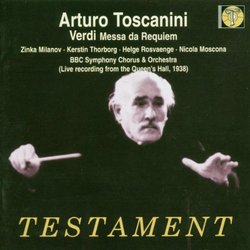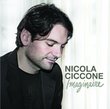| All Artists: Recorded Sound, Giuseppe Verdi, Arturo Toscanini, Kerstin Thorborg, BBC Symphony Orchestra, Zinka Milanov, Helge Rosvaenge Title: Verdi: Messa da Requiem Members Wishing: 0 Total Copies: 0 Label: Testament UK Release Date: 10/12/2004 Album Type: Import Genres: Special Interest, Classical Styles: Opera & Classical Vocal, Historical Periods, Early Music Number of Discs: 2 SwapaCD Credits: 2 UPC: 749677136222 |
Search - Recorded Sound, Giuseppe Verdi, Arturo Toscanini :: Verdi: Messa da Requiem
 | Recorded Sound, Giuseppe Verdi, Arturo Toscanini Verdi: Messa da Requiem Genres: Special Interest, Classical |
Larger Image |
CD DetailsSimilar CDs |
CD ReviewsFinally a Success Andre Gauthier | 09/05/2007 (5 out of 5 stars) "I must admit that from an early age I was taken with all things Toscanini. The cause is obvious to me now: RCA made all of Toscanini's recordings available for $2.99 on the Victrola label starting in 1965, and I was in high school that year. The recordings were a bargain, and the whiplash style seemed very exciting to a 17 year old. That continued until I began to encounter the other side of the conductorial record. Men such as Furtwangler and Jochum began to leap out of the speakers and those in the know pointed me in the right direction and cast doubt on the real interpretive abilities of "Maestro". By my fourties I was fairly finished with all but a few of "Maestro's" efforts on record. One was the 1939 Eroica symphony with NBC, it is a marvel no matter what people may think. The Rossini and Weber Overtures are amazing and some of the Wagner treatments are splendid. But take the Sibelius Fourth Symphony as an example that Toscanini was either sight reading the performance or had NO clue when it came to that piece. I've never heard a conductor get that work so wrong. But twenty years before I wouldn't have believed Toscanini could do any wrong. You see, in my early years I had read a lot of Toscanini's P.R. Most of it is garbage. He WAS a great conductor, but hardly the greatest that ever lived. You can spot his recordings quite easily by his shortening of unison chords and his heavy use of timpani. The string sound is also very precise, especially with the NBC, and the later recordings can be spotted with little difficulty.
With that in mind, we have a fourth (although it is actually the first) recording of the Verdi Requiem from London with the BBC orchestra made in 1938. It DOESN'T always sound like Toscanini and often sounds far more reflective than the same conductor does with either the New York Philharmonic and especially the NBC. (The notes for this recording say it is licensed from EMI, so like other Toscanini/BBC recordings, this may have been available earlier on LP.) On this recording I think Toscanini finally has his ultimate say with a piece he so dearly loved. Even Harvey Sachs in his always thorough notes says as much. Of course Sachs can tell you what Toscanini ate on a given day, and his listing of the Requiem's various recordings by Toscanini is very helpful to have as well as being very thorough. The next recording (that is also still available) was with NBC in 1940; it goes far afield in some places even though two of the soloists are the same as in 1938. The next recording is from 1950 at La Scala and has an all star cast. (It too can be found on Amazon, but beware the fact that its not really Toscanini at his usual, much less his best). The "official" 1954 RCA recording was made only a few months before "Maestro" put down his public baton for good. (He did come back and record a very fast "Ballo in Mascera" in 1955.) A brief aside about "Maestro". This is the name by which he was called by virtually everyone, with the exception of his family. The title "Mister" could cause a near catastrophe (as heard on the "Falstaff" rehearsals). However, the 1954 recording producers, Richard Mohr and Jack Pfeiffer, were visiting with Fritz Reiner. Pfeiffer let slip that they had to visit "Maestro tomorrow in Riverdale". Reiner lowered his glasses and said softly - "Maestro....WHO?" He knew perfectly well who, but wasn't going to be insulted in his own home! I always thought that summed up the myth of Toscanini in two words! So which of these four is worth the money? Frankly, 1938 was a great year for Toscanini and the Verdi Requiem. The BBC symphony is far superior in many ways to either the NBC or La Scala orchestras. The Brits had not been screamed at for decades as had the NBC by '54, and they seem to return the favor by playing with great style. Toscanini seems far more relaxed in London than he does in New York or Milan. His tempo in the opening Kyrie is very flexible. Having the stupendous early voice of Zinka Milanov, met at every turn by mezzo Kirsten Thorborg, helps this CD immensely. Moscona is the bass, but for my money he always sounds somewhat wooden, at least to the microphones at any rate. I've heard he was a great artist, and he is always involved in a barky sort of way. But I don't hear the same artistry that others profess to have encountered. Helga Rosvaenge is a fine German styled tenor, and gets a B+ for his efforts. The chorus is wonderful. Only the percussion and timpani are recorded anacronystically. The winds are often too close to the microphones. Yet all in all the spiritual nature of this massive piece is as well realized on these two CDs as Toscanini ever managed. (Something else could have been added to the very short CDs, I might add.) The same sort of performance is attempted in 1940 again with Milanov and Moscona. But the NBC is not as disciplined as they would become, nor do they have the polish of their British counterparts. For years it was a rare "pirate" broadcast, which made it fun to own, but its deficiencies are simply too obvious to recommend this set as representative of Toscanini or even Milanov. She misses the mark quite often here. The La Scala set looks really interesting on paper. I did not know about it until I found it on Amazon. Some of the solo singing is quite fine, especially that of Cloe Elmo and Siepi, some of Tebaldi's is lovely although she sang flat even then! Giancinto Prandelli is OK in the tenor's solos. Finally we have the most technically polished version in terms of a recording. Had it not been such an important recording for RCA, an attempt could have been made to record it in stereo. It was made on tape, unlike its predecessors, and has a great trio of singers in Mezzo Fedora Barbieri, Giuseppi de Stephano and Bass Cesare Siepi (he made the famous Don Giovanni recording with Furtwangler in the same year). I say trio, because soprano Herva Nelli just doesn't cut it. I always want to find something to like in her singing, but she simply sounds juvenile to me. Maybe if she were on stage today she might be more interesting than Renee Fleming who pairs up with Bochelli! Try as I might, I simply do not like her sound and never will. The chorus is throughly American in its sound and the orchestra plays much better than 14 years previously. Still, this is not a "live" recording, because as Harvey Sachs himself says, rehearsal episodes are cut into the performance. (This habit got totally out of hand during the reissue of the entire Toscanini series.) Toscanini was still on the Milanov Bandwagon in 1944 when she recorded the most astonishing fourth act of Rigoletto ever put on record. Why he ditched here (and she was an RCA artist as well) for Nelli will always be the greatest of mysteries. So while Testament's is not great value for the money in terms of filling up the CDs (RCA includes the Te Deum and two other pieces that were made for 45 rpm recordings) the label does have the very powerful advantage of putting out the very best Verdi Requiem, in all ways, of Arturo Toscanini." |




